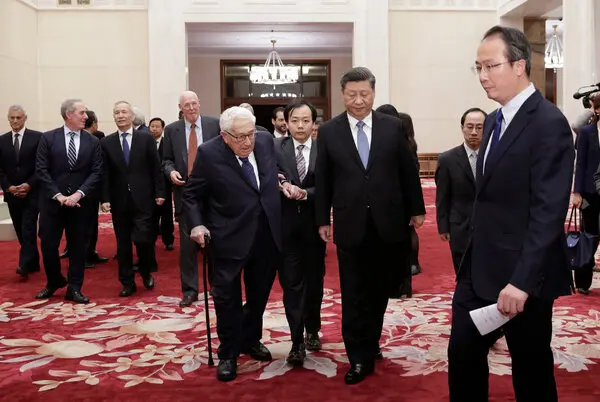The former secretary of state’s private visit to China serves as more than a diplomatic gesture: it is a strategic effort to understand the Chinese leadership’s perspective amidst an impending financial crisis while hinting at potential conflict, the need for peaceful negotiation, and averting grave damages as much as possible.
In an unexpected twist of international diplomacy, 100-year-old Henry Kissinger recently embarked on a “private trip” to China, amidst escalating tensions between the two superpowers. The centenarian’s journey sparked intense debate and speculation. Kissinger, once a bridge between the two nations during the Cold War, now carried a weighty mission under the aura of his legacy.
But the intent of this visit was not to defuse the ticking time bomb of the US’s $31.4 trillion debt or to discuss the heated trade war. Nor did it pertain to Taiwan, another critical contention point. Instead, Kissinger sought to gain a deeper understanding of the Chinese leadership’s perspective, to serve later as a private conduit of information to the US government.
Unlike recent ones by US officials, this visit included a meeting with Chinese President Xi Jinping at the Diaoyutai State guest house in Beijing, underscoring the level of esteem and respect that Kissinger commands in the political echelons of both nations. The groundwork for this rendezvous was laid two months ago, with the intent to facilitate more candid discussions between the centenarian and Chinese leaders.
However, to comprehend the full import of Kissinger’s trip, we must understand the context of the impending financial crisis. The US’s soaring debt threatens to destabilize global economies, wiping out millions of jobs and trillions of dollars in pensions. Rather than addressing this elephant in the room, Kissinger might have aimed to discuss a grimmer potential fallout: war.
When Xi Jinping initiated his first term, he received counsel that China’s economy would not survive a US bonds crash. Hence, China launched a deleveraging campaign in 2013. This preemptive measure resulted in the bankruptcy of two of its largest real estate developers in 2021. China circumvented a potential economic disaster by defusing its financial and real estate bubbles in a controlled manner.
Critics argue that Xi is pushing China toward the brink of collapse. However, Kissinger’s visit suggests an alternative narrative. If the purpose of his travel was indeed to discuss the prospects of a Sino-US war, it implies that China’s economic self-insulation from the imminent US bonds crash is a strategically sound move.
This visit is as much about Kissinger’s legacy as it is about potential international conflict. His apparent willingness to jeopardize his health for such a long journey underscores the urgency of the situation. It also brings into focus the evolving dynamics of the Sino-US relationship.
The US economy is on shaky ground, and an exit strategy seems elusive. If war is indeed on the horizon, Kissinger’s mission could be to discuss ways to minimize the damage when conflict ensues, rather than if. Such a conversation may draw upon his historical role in fostering Sino-US relations and strategic acumen in navigating complex diplomatic landscapes.
A Chinese phrase—危机 (wei ji)—emerges as a beacon of hope in the shadow of escalating tensions. It signifies that within every crisis lie hidden opportunities. As the ‘Kissinger-style diplomatic wisdom’ is called upon again, it is hoped that his legacy might guide the US and China to find a peaceful path amidst an impending storm.




